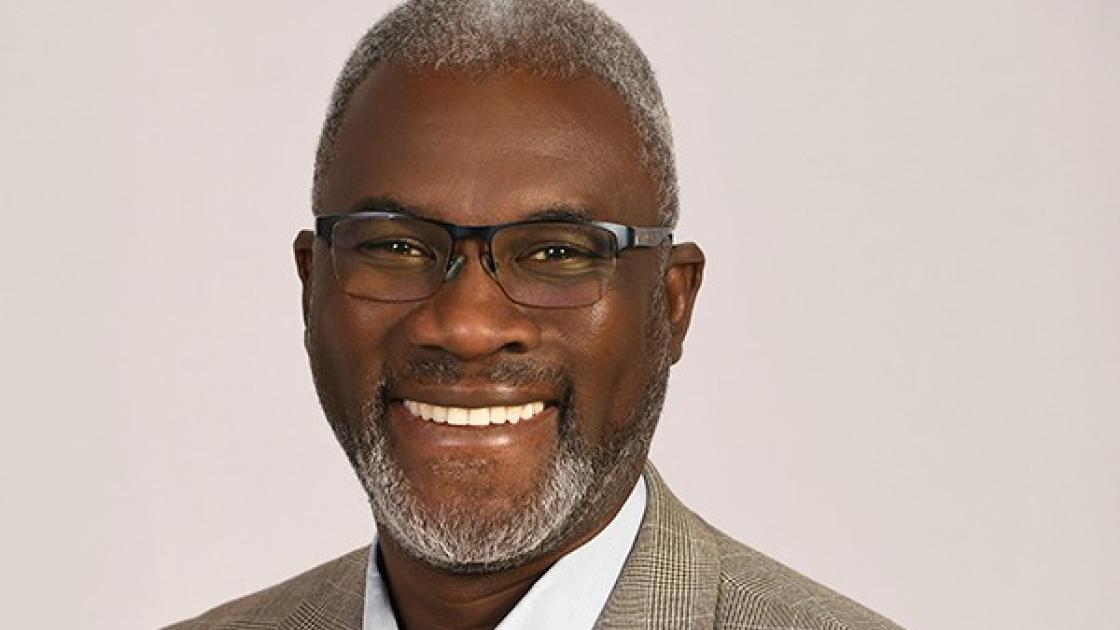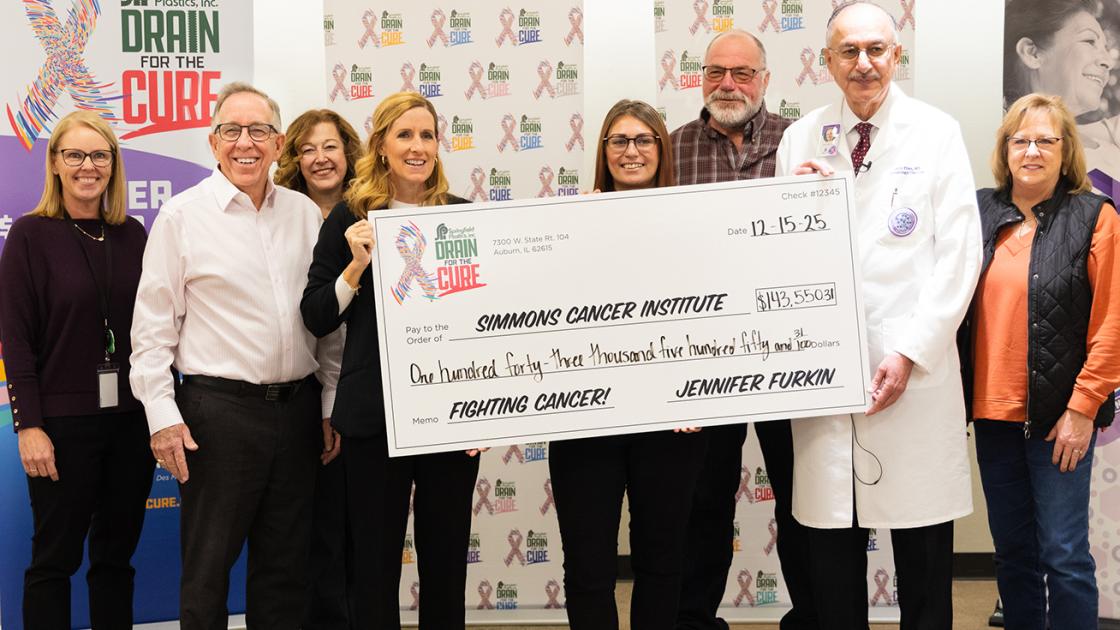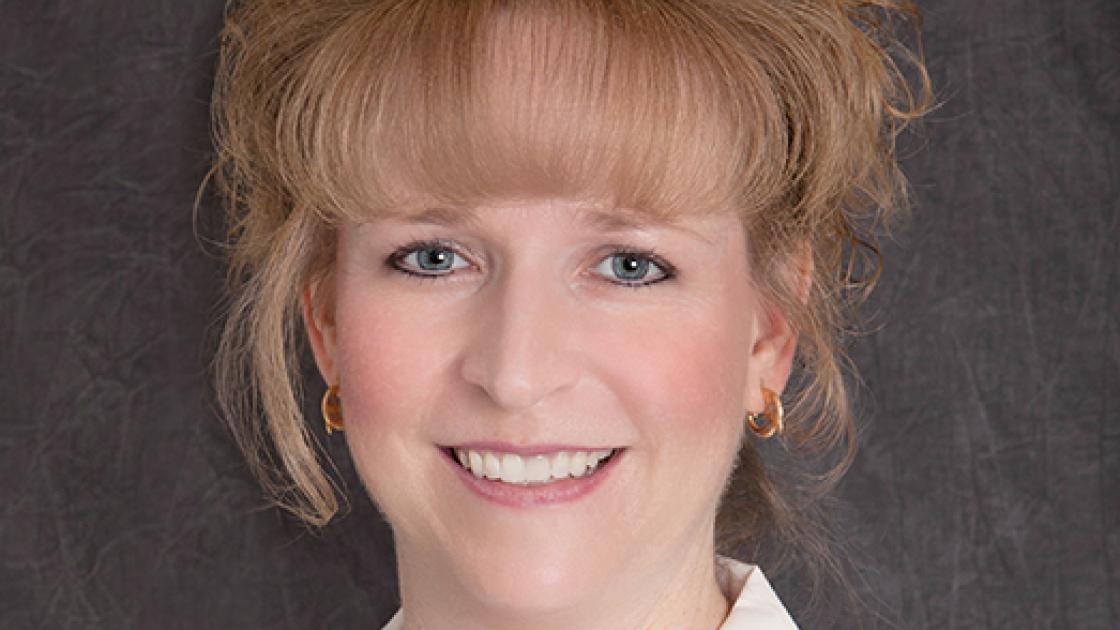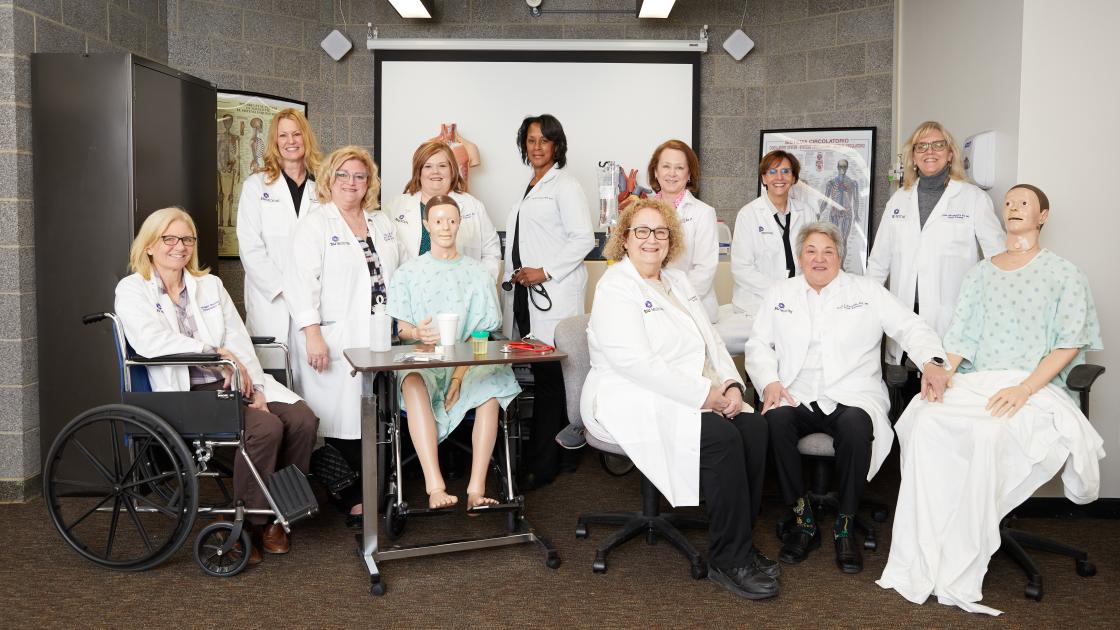
Nurse educators fill vital role for medical students
By Steve Sandstrom
Early on a February morning, a half-dozen medical students begin to fill up the couches outside the nation’s first Professional Development Laboratory (PDL) on the third floor of SIU School of Medicine. Nurse educator Karen Reynolds, MS, RN, counts heads as they settle in for a clinical practice exercise.
A military veteran, Reynolds has decades of nursing experience in retirement homes, pediatric care and the emergency department at Springfield Memorial Hospital. She moved to SIU in 1995 as the director of infection control, and in 2000 shifted her focus to assisting medical students as a nurse educator.
Reynolds launches into the case description for the students’ clinical simulation, part of the Year 2 Neuromuscular/Behavior Unit training. The students are told the standardized patient (SP) they are about to examine is a 20-year-old female admitted to the ER at 2 a.m., presenting with anxiety, chest pains and shortness of breath. Reynolds looks around the room. “So what are the things that are the most alarming, the top couple of things that could kill her?”
A chorus of students respond with “M.I.”
“Yes. It’s highly unlikely at her age, but an MI [myocardial infarction] will still need to be checked. What else?”
“Aortic dissection,” one suggests.
“That could be bad, absolutely. What would be characteristic of that?”
As the roundtable discussion kicks in, Reynolds peppers the students with questions on symptoms and system differentials, shifting to include potential mental health disorders and drug use.
Throughout, she reinforces their ideas with affirmations and probes for more: “That’s a good one.” “Sure, go for it.” “I think you hit all the high points there.”
Tips and tidbits are shared. She suggests the learners keep their minds and eyes open for indicators of psychiatric neuroses, like skin lesions and hair loss.
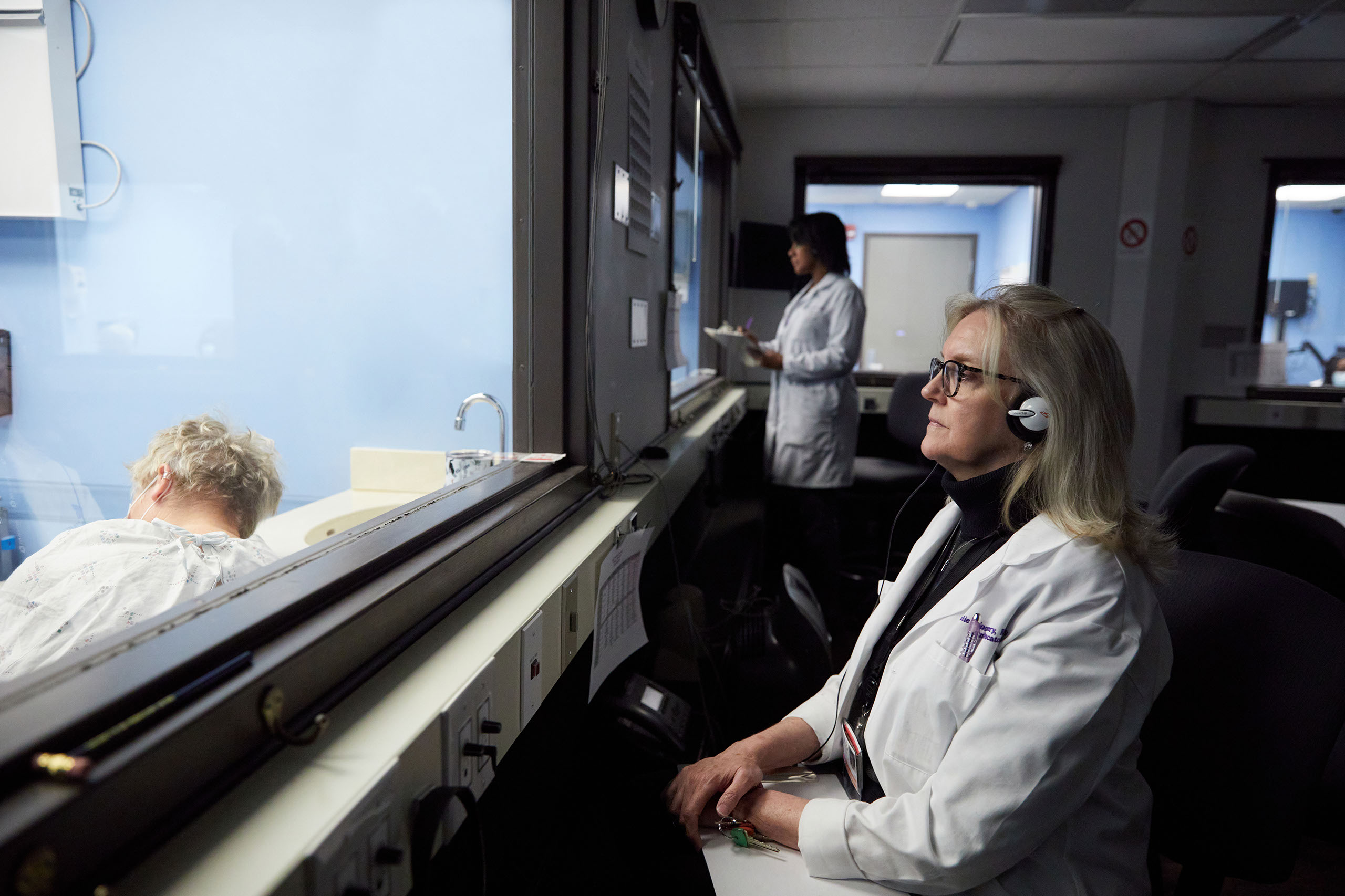
They disappear around the corners to hone their interviewing and diagnostic skills. Reynolds steps into the PDL’s viewing room to watch the performances in progress, observable through two-way mirrors that encircle the space.
Karen Reynolds, MS, RN is confident the SPs will challenge the students — but in a good way, having trained some of the actors herself. And she cares for these young learners who are trying to polish their clinical skills while showing curiosity and compassion.
An empathetic attitude epitomizes the nurse educators at SIU Medicine. They work hard to make life easier for the institution’s physicians, and its physicians-to-be.
PART OF THE TEAM
In the school of medicine’s storied history of medical education innovations, the use of nurse educators is rated near the top by its academic leaders and students. SIU is one of only two medical schools in the nation who use nurse educators extensively in their curriculums (the other is the University of Southern California). The premise is simple: Experienced master’s-degree-educated nurses devote their days to educating students and helping them develop good clinical skills.
Nurse educators have been embedded in the culture of SIU School of Medicine since its first decade, working in groups or individually to ensure students receive guidance.
Why nurses?
RNs have been considered the ‘most trusted profession’ in the United States for decades, according to Gallup polls. They receive this recognition because of high ratings in honesty and ethics. RNs interact with both patients and doctors across a multitude of health care settings, as the ever-reliable ‘go-between.’
And besides being trained caregivers, nurses have long soothed the fears of medical students who were learning their way around hospitals and clinics. The students experience firsthand that nurses are observant and knowledgeable, which fosters a positive teamwork attitude that carries over into their medical careers.
Roland Folse, MD, the first chair of SIU’s Department of Surgery, formalized the position in his department back in 1978. He hired Norma Wylie, MSN, RN, as the school’s first nurse educator. The department’s faculty and students quickly embraced the program.
When SIU School of Medicine revamped its curriculum in 2000, the nurse educator program expanded to include other departments. In addition to two in Surgery, eight nurse educators now work in the Office of Education and Curriculum, serving nearly every clinical department. “I think it’s our most innovative technique since standardized patients,” says Deb Klamen, MD, MHPE, senior associate dean for education and curriculum.
During the school’s 2007 accreditation visit, officials from the Liaison Committee for Medical Education (LCME) were greatly impressed and somewhat surprised with the success of the nurse educators. In its final report accrediting the medical school, the LCME committee called the nurse educator program “a unique model for medical student education that enhances the overall quality of the curriculum.”
What can nurse educators teach medical students that physicians can’t? “A lot,” says Klamen. “They are powerful, focused professionals and they’re doing this full-time. They bring a richness and depth to the medical students in the clinical arena. They are very good at it.”
The nurse educators share tips on how to navigate patient care systems and make sure students are getting their academic requirements; they teach students some clinical skills; they develop, administer and grade exams; they train students to interview patients; and many also train standardized patients.
Cheryl Ashburn, RN, MSN, has served as a nurse educator for the Year 3 Obstetrics and Gynecology Clerkship since 2006. Previously, she spent 10 years as a home-health nurse, a decade teaching clinical skills at Lincoln Land Community College, and six years with the Cub Scouts and Boy Scouts, which she saw as another skill-builder. “It taught me how to herd cats,” she says.
Ashburn and Reynolds attended nursing school together, then reunited at SIU when Reynolds told her about the open nurse educator position. “I had no idea this was an option,” she says. “I now know how unique we are. I go to national conferences a couple times a year, and there are very few nurses coordinating training at the clerkship level.”
Like most of the team, Ashburn also helps with the second-year students, tracking about a dozen throughout the year. There is a lot of behind-the-scenes work to schedule the gamut of clinics and surgeries. She considers the nurse educators’ essential role to be a coordinator and a liaison between the students and the clinical faculty. “We can act as a buffer, and sometimes as a mom. In the clerkship, I tell them, ‘I want you to feel confident in what you’re supposed to be doing. If I can remove some of the anxiety, you can dig in and learn.’”

Beyond what they provide the learners locally, several of the nurse educators have shared the program’s innovations through educational research projects, including improving student feedback methods, student outcomes, students’ efficiency in taking history and physicals and research in population health. For example, Year 3 Surgery Clerkship nurse educators Maggie Boehler, RN, MS, and Cathy Schwind, RN, MS, developed a mock page curriculum for SIU’s Surgical Resident Prep Course in 2002. Its popularity caught on, and since 2011 the program has been part of the National Curriculum of Resident Preparatory electives used by medical students across the U.S. It is consistently ranked among the highest experiences within the students’ ‘boot camp’ exercises.
“The role of the nurse educator has endless possibilities,” says Boehler.
REELING IN THE YEARS
In Carbondale, Year 1 SIU medical students get their first flush of encouragement and feedback from physicians as they launch into the framework of patient care. They’re coached and observed by a trio of educators: Lynn Rheinecker, PharmD; Beth Bigham, MD; and Kelly Higgins, MD. Dr. Mick Lynch supervises the team. Rheinecker communicates with the nurse educators in Springfield each month to keep training streamlined. The students get formative practice throughout the academic year, receiving input on note writing, documentation and clinical skills.
They see their first standardized patient within the first week in Carbondale, and learn to ask every question in the question bank, says Reynolds. “Up here, we teach them how to focus and hone it down.” For example, the February psychiatry simulation was a practice lab, with no official observation. The standardized patients provided feedback from within the patient-physician communication realm. But as the students advance through subsequent years of training, other providers will watch them, share their notes and expectations will rise.
Leslie Montgomery, MS, RN, CCRN, has enjoyed serving as a nurse educator for the doctoring curriculum since 2008. “Working with faculty and students is extremely rewarding,” she says. Nurse educators can teach students about compassion, empathy and caring for the whole patient. “We can offer a holistic view of a patient’s needs — bio, psycho, social — because that’s how nurses are trained. It aligns with SIU’s mission to stress the importance of the social determinants of health, how factors outside the clinic space impact the patient’s life.”
Sharing their experiences throughout the second and third years of student education, the nurses give individualized feedback that makes a huge difference in the students’ progression. But just as critical is the nurse educator’s ability to listen, says Carolyn Holmes, MSN, RN-BC, CCHP. Holmes began as an RN in 1989, working alongside SIU rheumatologist (and future dean) Kevin Dorsey, MD, PhD, at Memorial Hospital of Carbondale. She now oversees the Year 3 Neurology Clerkship.
During group sessions, the medical students will often share what they have studied or brought with them from research work they’ve done or a previous job. “Some of our students have been medical scribes, clinical assistants, registered dietitians and EMTs. We have even had experienced pharmacists in our student groups.” Holmes says. “As nurse educators, it is important to create a climate for students to share what they know, as these open communications enrich the learning experience.
“Our official title is ‘curriculum development specialist,’ but we’re all known as nurse educators,” says Staci Becker, RN, MSN, and educator for Psychiatry’s Year 3 Clerkship since 2000. “We see it as a privilege to work with these outstanding students and future providers.”
The feeling is mutual. Student evaluations for Becker illustrate the NE’s knack for imparting knowledge: “Staci provided feedback that wasn’t generic, but truly offered strategies to make psych interviews more fruitful and less intimidating for the patient.” “... a highly willing educator, giving relevant and useful clinical instruction and pearls at every opportunity.”
Nurses have always served as strong patient advocates, Montgomery says. “Now that we’re here at the medical school, we have expanded that focus to advocating for the students. We like to get to know them and become a cheerleader of sorts for them. We want them to feel comfortable with us, and hope that they’ll talk to us if there’s stuff going on in their lives that affects the way that they’re learning.”
“We’re the non-threatening health care providers,” says Boehler. “Students come to us when they need us. It’s really rewarding.”
Second-year student Michael Brown concurs. “My experience with the nurse educators has been nothing but positive. They are all very friendly, and well-versed in the hard and soft skills of clinical medicine. Karen [Reynolds] has taught me a lot. One of the most valuable things she demonstrates is a genuine concern for our best interests. She is always willing to work with me and others to make sure we’re prepared to succeed.”
Student Molly Smith credits nurse Montgomery for her rapid growth as a clinician in Year 2. “She is always enhancing my knowledge and understanding with her notes, assessments and feedback, and her tips and tricks have led to an improvement in my performance.”
By being ever-present and accessible, the nurse educators become the resource that keeps on giving, Smith says. “My interactions with all of the nurse educators have been great, but I can rave about Leslie because I feel like we’re a perfect pairing. “Whenever we get together I catch her up on what I’m doing. She encourages me every chance she gets. Feeling really supported by someone while you’re in medical school is the greatest gift you can give a student. I’ve received that from Leslie.”
Mary Aiello, director of the Office of Education and Curriculum’s standardized patient program, also appreciates what the nurse educators add to the mix. “I’ve got a wealth of professionals with clinical experience who can train our standardized patients across the curriculum. It’s an enviable position compared to the rest of the country.”

Dr. Roland Folse made a leap of faith to add nurse educators to the curriculum back in the ‘70s. Cheryl Ashburn sees the evidence-based proof of his concept each July. “When I meet the four new OB-GYN resident interns at the beginning of each year, they are often from different schools. Many have never delivered a baby, which they can do in our clerkship.
They haven’t had the level of clinical immersion that our students get,” she says. “SIU students really have a leg up.”
With their patient-focused, cumulative knowledge, nurse educators are the approachable and valued team players built to better prepare new physicians for what comes next.

